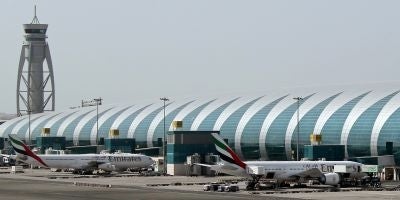Your support helps us to tell the story
From reproductive rights to climate change to Big Tech, The Independent is on the ground when the story is developing. Whether it's investigating the financials of Elon Musk's pro-Trump PAC or producing our latest documentary, 'The A Word', which shines a light on the American women fighting for reproductive rights, we know how important it is to parse out the facts from the messaging.
At such a critical moment in US history, we need reporters on the ground. Your donation allows us to keep sending journalists to speak to both sides of the story.
The Independent is trusted by Americans across the entire political spectrum. And unlike many other quality news outlets, we choose not to lock Americans out of our reporting and analysis with paywalls. We believe quality journalism should be available to everyone, paid for by those who can afford it.
Your support makes all the difference.Emirates has become the latest major carrier to hike its ticket prices because of the rising cost of fuel, but a new idea from the US could provide travelers with a solution.
Dubai-based Emirates confirmed earlier this week that its ticket prices are to go up, citing the rising price of fuel and saying that the current volatility, caused in part by events in the Middle East, made it impossible for it to absorb the impact of fuel prices.
The airline's passengers will see raised prices from this week, although a spokesperson told UAE-based Arabian Business that the increase would "differ by markets and routes."
Emirates is the largest airline in the region and rapidly growing to be one of the largest in the world - last year it carried approximately 25 million passengers internationally, ranking it sixth globally.
Several other major airlines, including Qantas, British Airways, Cathay Pacific, JAL, ANA and Singapore Airlines have raised their fuel surcharges in recent months.
Emirates' fare increase is yet another sign of the growing concern in the industry over the price of oil, with the International Air Transport Association warning separately March 2 that "the industry is performing a balancing act on a very thin tight-rope."
But in the face of such concerns, one airline in the US appears to be looking for a way to pass on this gamble to customers.
Allegiant Air, a low-cost airline which serves leisure travelers in the US only, is reportedly considering allowing customers to "hedge" the risk of a price increase by offering two types of ticket to those looking to book a flight.
One would offer the flight with the price of fuel locked-in, but the other type would be a lower fare ticket, the cost of which could change after booking should the price of fuel rise, resulting in further charges for the passenger.
The suggestion prompted an immediate complaint from AirlinePassengers.org, a new consumer group who said that the plan was a way to shift airline business risk onto the consumer, contract to passengers' interest.
While US authorities would have to approve any such plan for it to be implemented, asking passengers to absorb the risks associated with fuel prices could prove a new way for the airlines to save costs, albeit at a potentially high price for the rest of us.

Join our commenting forum
Join thought-provoking conversations, follow other Independent readers and see their replies
Comments